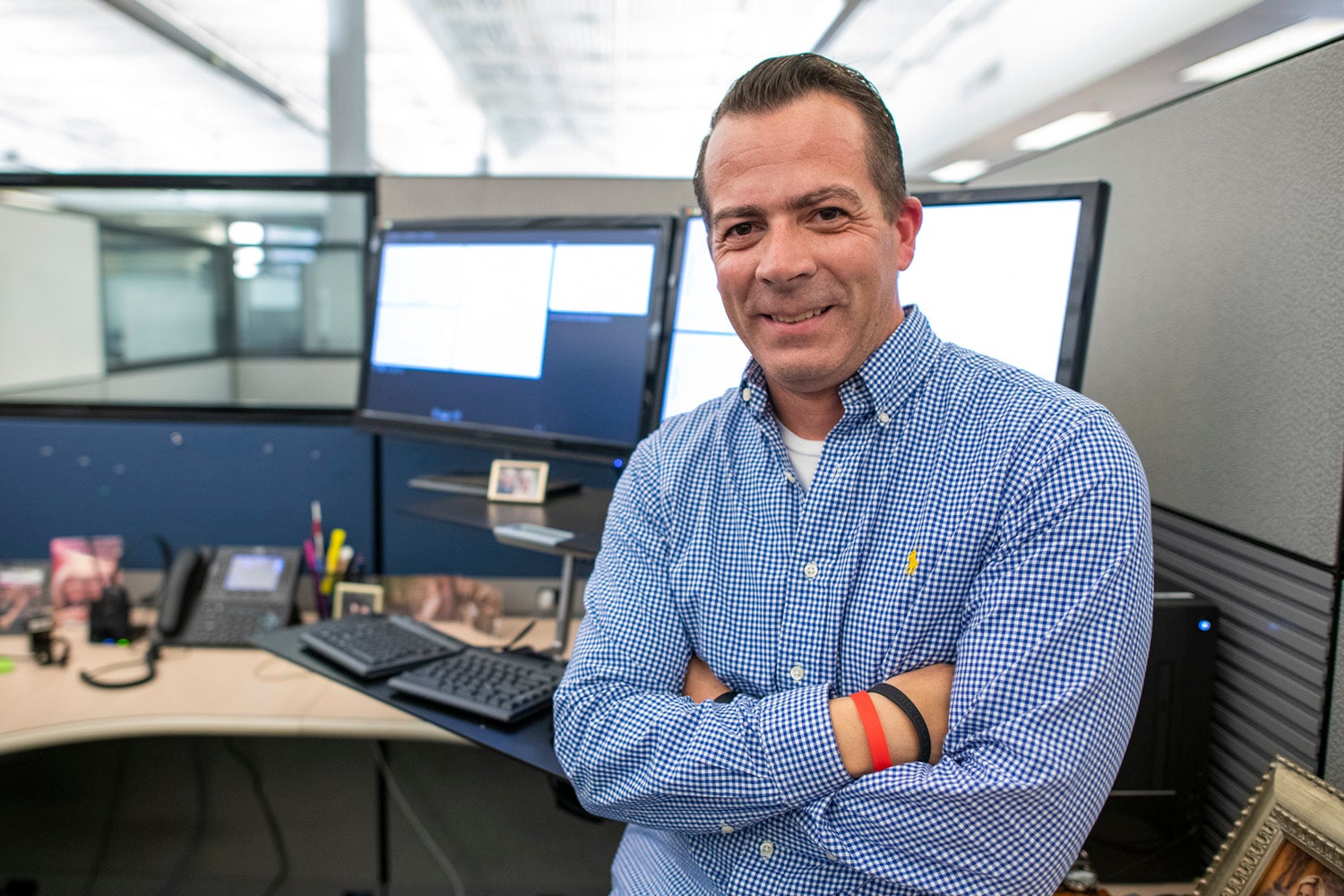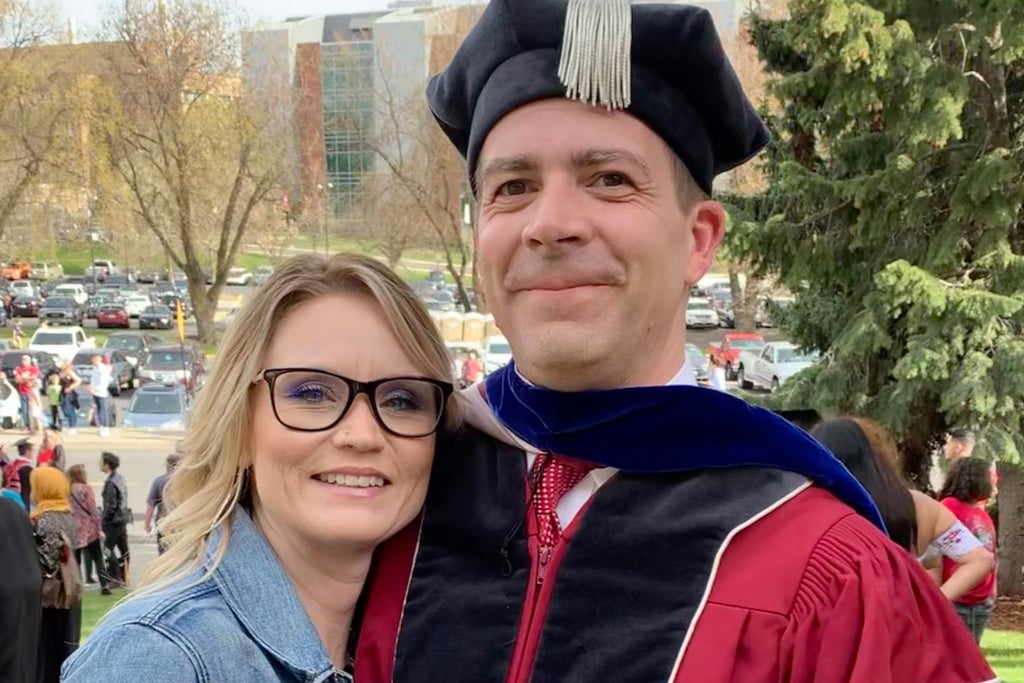One day in January of 2002, Noel Vest’s mother was at home in Vancouver, Washington, when she came across a newspaper article about an unidentified theft suspect on the run from local authorities. Accompanying the article were two grainy surveillance camera photos depicting the fugitive, whom she immediately recognized.

After a complicated path to a science career, Noel Vest recently joined Stanford Medicine as a postdoctoral scholar in the Systems Neuroscience and Pain Lab. (Image credit: L.A. Cicero)
“That was the first time she learned about the extent of [my criminal activity],” Vest said. She was the one who reported him to police.
The crime shook Vest’s family and landed him in jail. It also wasn’t an isolated incident, but rather one in a string of offenses in multiple states that culminated with a lengthy prison sentence.
Vest’s errant past and personal struggles, which included drug and alcohol addictions, contributed to his downward spiral. But after hitting rock bottom, he would begin to turn his life around in a dramatic way. Vest’s long and complicated path would eventually bring him to a new life of academic scholarship, medical research and advocacy. He is now at Stanford, where he’s a postdoctoral researcher in the Systems Neuroscience and Pain Lab.
A life removed
Growing up in Washington, Vest said he was not a particularly studious kid. After high school, he briefly attended college, but left to start his own business when he was 21.
“It was called Brace Yourself Sports Medicine. A mom-and-pop shop,” he said. “We sold ankle and knee braces, and stuff like that.”

Vest presents his research at a conference held by the North American Society for the Study of Personality Disorders in Boston, Massachusetts, April, 2014. (Image credit: Courtesy Noel Vest)
Vest said he wasn’t particularly passionate about his job and that his relationship with his business partner declined. In the meantime, his girlfriend of six years, with whom he had a daughter, began pressing him to get married. But Vest said he wasn’t ready, and they broke up.
“Five months later she married another guy,” Vest said. “I’d never felt pain like that.”
To cope, he turned to drugs and alcohol. But what started as recreational use turned into dependency.
“I spent a few years in a spiral of addiction,” he said, adding that it took a toll on his personal relationships.
“My friends and family were not trusting me, and my business partner didn’t want anything to do with me,” he said. “Then I got into criminal activity.”
Over the next few years, Vest racked up felonies in Washington, Oregon and Nevada. In 2003, he was sentenced as a habitual criminal in Nevada – where his most serious crime occurred – and was sent to a state prison for seven years.
Prison was a contemplative time for Vest. He attended self-help programs, worked one-on-one with other substance users in recovery and took courses through the College of Southern Nevada. Vest also found support through an Alcoholics Anonymous group, which he said was a major step in his recovery and helped him identify a potential career he could pursue once he completed his sentence.
“That was a huge help, and it set me up for wanting to be a drug and alcohol counselor,” he said.
Making a fresh start
On June 28, 2009, Vest completed his sentence and walked out of prison. He returned to Washington and enrolled at a community college – an educational experience he said was “awesome.” That’s also where he met his wife.
During Vest’s first year, a professor who was impressed with his work encouraged him to pursue graduate school.

Vest and his wife, Ryelee, attend his commencement ceremony from Washington State University in May 2019. (Image credit: Courtesy Noel Vest)
“That was a turning point,” Vest said. “It was the first time I thought I could seriously attain a career beyond being a drug and alcohol counselor.”
He earned an Associate of Arts degree in chemical dependency counseling and transferred to Washington State University, Tri-Cities. There, a professor took him under her wing and got him involved in research into chronic pain and substance use disorder, among other areas. That, in turn, sparked his interest in research.
Vest graduated with a bachelor’s degree in psychology in 2013 and returned to WSU in Pullman a year later to begin a five-year PhD program. His doctoral research focused on the intersection of mental health and substance use disorder, specifically borderline personality disorder and prescription opioid misuse. Through counseling and research, Vest learned that substance use is a disease. Although incurable, those living with it can have successful and fulfilling lives.
Vest noted that his pursuit of higher education would have been much more difficult had his college application inquired about his criminal record. For many formerly incarcerated people, such questions can be enormous barriers to education and careers.
“Reentering society after prison is already hard enough, and placing restrictions on employment, housing and education only serves to dehumanize this already highly stigmatized group,” Vest said. “We know that nothing is more effective at reducing recidivism than obtaining a college degree.”
That’s why Vest helped draft the 2018 Fair Chance in Higher Education Act, a bill that prohibits colleges and universities across Washington state from asking applicants about their criminal records before offering them admission. He said his advocacy spurred his interest in public policy.
“Having previously failed political science [in high school], it was interesting to see the legislative process unfold,” Vest joked.
Coming to Stanford
Toward the end of his doctoral studies, Vest began applying to postdoctoral programs. He considered a few schools, but said that learning of his acceptance to Stanford was a moment of extreme elation.
“I probably danced a happy dance!” he said. “It was the culmination of a lot of hard work and fostering relationships.”
Since arriving in May, Vest has been acclimating to the Farm and the Bay Area. He’s currently working with Sean Mackey, professor of anesthesiology, perioperative and pain medicine, and Keith Humphreys, professor of psychiatry and behavioral sciences. Vest’s research will focus mainly on substance use disorder and mental illness. While he’s in California, he also plans to advocate for legislation similar to the Fair Chance Act that he helped pass in Washington.
Vest, who is the first in his family to graduate from college, said that 20 years ago he never imagined he’d be where he is today. He also said that while he credits his family, especially his mother, for supporting him along the way, he always suspected that they thought he’d return to prison.
When asked what his family thinks about his success and joining Stanford, he said it’s beyond their wildest dreams.
“I’ve definitely exceeded their expectations,” he said.